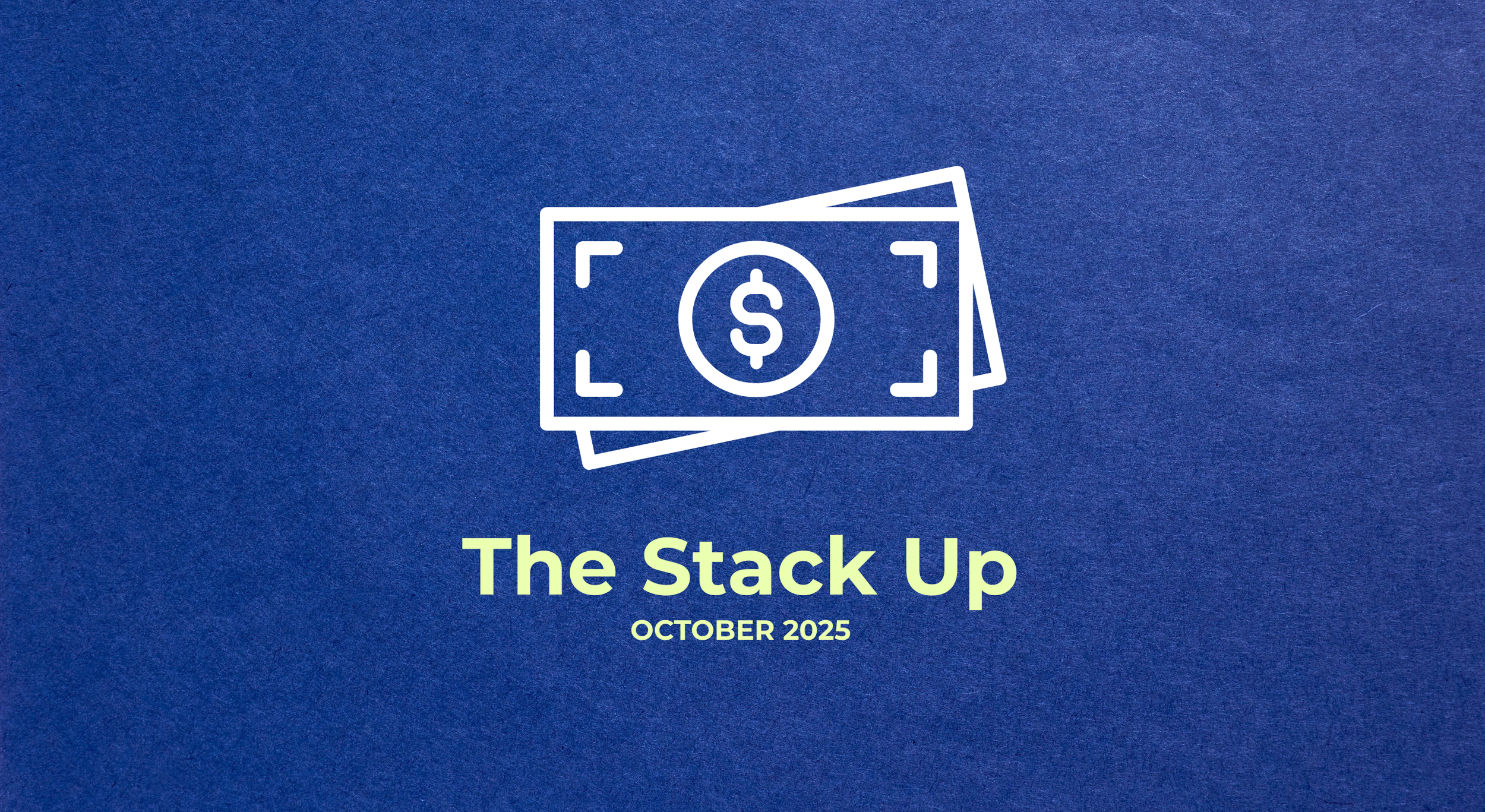Where legacy lives
What’s ahead
Where legacy lives: Reflections from Morehouse Homecoming 2025
What does the government shutdown mean for my money?
Community spotlight: Stacks over status
Tap in to Stackwell Sounds
Where legacy lives: Reflections from Morehouse Homecoming 2025
Every fall, HBCU campuses transform into something more — a reunion, a celebration, a reminder of legacy. This month, our very own Community Manager, Chase, made the trip back to Morehouse College Homecoming. We asked him what it meant to return to “the House,” how it shaped the person he is today, and why spaces like this matter in the journey to build wealth, community, and purpose.
Q: Why did you decide to go to Homecoming this year?
Chase: I think for me, Homecoming is always particularly special because my grandfather and my uncle went to Morehouse. I’ve always been surrounded by Morehouse growing up, and so whether or not I knew I was going to attend there, I’ve always been around that ecosystem.
It’s just like a big family cookout. Everybody loves to see family, everybody loves to dance, everybody loves to drink and have a good time. That’s where we go and meet our cousins who aren’t actually our cousins — but they’re still family. You get to network with people you haven’t met before, that your friends connect you to, and it can lead to new opportunities.
You’re going to be entertained, you’re going to be fed. And if you get lost, someone’s going to make sure you are found. It’s a really good place to feel like you belong — especially in a world where most people feel like they don’t belong in any setting.
Q: What’s your favorite Homecoming memory at Morehouse?
Chase: It’s funny, what’s coming to my mind is last year — at the height of the party, I don’t know how else to describe it — there was this older man getting jiggy in the middle of the field. He was getting down to Michael Jackson or The Jackson Five. Everybody had their eyes on him, and right after that, because of how funny it was, we had a dance competition.
A memory that’s more sentimental to me is my senior year at Morehouse. My uncle and my grandfather, who were both alumni, came to watch me play football. It made me realize how close I am to continuing my family’s legacy.
I think when you go to an HBCU, especially if you’ve been in predominantly white spaces, you kind of lose a sense of who you are as a Black individual. It’s because of my family and my community at Morehouse that I learned how to be Black — that it’s okay to be Black — and that you can be exceptional at doing it.
Q: What does coming back to Morehouse remind you about who you are and what you’re building?
Chase: For me, when I grew up, I actually watched my father get arrested on television when I was seven. I had to wipe the tears off my mom’s face and tell her she won’t have to financially struggle when I get older — and I also made a promise that other families I come in contact with shouldn’t have to struggle either. It’s all part of my mission.
Going to Morehouse gave me the foundation to understand who I was as an individual — not just in the world of sports, because I was an athlete there — but who I could be as a Black man.
So when I think about what I was put on this earth to do, coming back home puts me in a space where I can get a rejuvenation, like a burst of energy. Homecoming is where you go to really get recharged.
At Stackwell, we believe wealth is about more than numbers — it’s about identity, community, and knowing where you come from. This month, Chase reminds us that legacy is built both in the work we do and the places that continue to shape us.
What does the government shutdown mean for my money?
Earlier this month, the government shutdown began after Congress missed the deadline to approve next year’s annual appropriations bill — the plan that determines how much money the government will spend, and where it will go.
As the shutdown continues, more Americans are starting to feel the ripple effects. The markets have stayed relatively steady in recent months, even with ongoing political uncertainty — but when paychecks, healthcare, or public services are disrupted, your financial plan can start to feel shaky. So what can you expect? Let’s break it down.
Federal workers are missing paychecks — and facing uncertainty. Roughly 2.3 million federal workers aren’t getting paid until the shutdown ends. They’ll receive back pay when it’s over — but for people living paycheck to paycheck, a delayed paycheck can mean missed bills, increased debt, or dipping into savings.
Meanwhile, thousands of federal employees have been laid off in recent weeks. Depending on who you ask, it’s either an attempt to reduce waste or a tactic to apply political pressure — but either way, it leaves workers and families in limbo.
(And if you’re wondering — no, the people making these decisions aren’t the ones missing paychecks.)
Government contractors lose out. Government contractors keep our public spaces clean, repair roads, support hospitals, and more. But unlike federal employees, contractors aren’t guaranteed back pay when the shutdown ends.
Pro tip: If you’re a federal worker or contractor, you may be eligible for Unemployment Insurance through the Office of Personnel Management. You can learn more about that program through the National Employment Law Project.
The cost of your healthcare is on the line. At the center of this shutdown is a disagreement over a tax credit that helps 22 million Americans afford health insurance. Democrats are refusing to move forward on the spending bill until this credit is extended — because without it, health insurance could become unaffordable for millions.
According to a recent report from KFF, without this tax credit, the average monthly premium for marketplace insurance could jump from $888 in 2025 to $1,904 in 2026. The Congressional Budget Office estimates that around 4 million people would likely cancel their insurance because they simply couldn’t afford it.
Even if you don’t receive this tax credit yourself, the impact is shared. When fewer people are insured, hospitals receive less funding, emergency rooms become more strained, and delays in care and poorer health outcomes ripple through entire communities.
So, what should your plan of action be? The truth is, none of us can predict exactly how long the shutdown will last, how the markets will react next month, or what lawmakers will decide.
But we can control how prepared we are.
The best defense against uncertainty is a financial plan that helps carry you through both the ups and the downs — one that includes emergency savings, manageable debt, and long-term investing.
That’s where Stackwell comes in. We help you make investing a steady part of that plan — automatically, consistently, and in a way that supports your future, no matter what’s happening in Washington.
Community spotlight: Stacks over status
At 24 years old, Marlon is in the middle of writing his next chapter. A current service member, he’s chasing a career in aviation, working toward his Airframe and Powerplant license and looking ahead to what’s possible. Like many people his age, he’s got money on his mind.
“I’m all about bettering myself and taking opportunities,” Marlon says. “So, I’m going wherever the money’s going. If there’s a lot of money to be made, I’m going there. I’m all about making money for sure.”
That hunger to grow — to level up his career, his finances, and his future — has been his driving force since leaving the military. But like many young adults making that transition, the financial side wasn’t easy at first. Before Stackwell, Marlon’s relationship with money was simple: earn, spend, repeat.
“I wasn’t saving anything. I was kind of just surviving and spending it,” he admits. “Before joining Stackwell, I was — I’m not going to say I was at my lowest — but I was struggling. I didn’t really have the connections I have now, where I’m investing or making money. As far as my situation, I was kind of just making it through.”
The biggest change since joining Stackwell hasn’t just been the money — it’s been Marlon’s mindset too.
“My budget? Like I said before, I was just spending. Like, I get a check — I spend it,” he recalls. “After I got introduced to the app, I started controlling what I was doing, watching my budget, watching my spending. Instead of going to the mall to buy Js, I’m putting that money toward the app, toward more stocks.”
At Stackwell, we believe that when you open an account to start investing, you put your finances in focus. We’re not just building wealth through investing; we’re inspiring intention and building on it with resources designed to grow your knowledge.
If he could go back, Marlon knows exactly what he’d tell his younger self. “Start. Start, man. Start saving. Start looking into stocks. It’s never too late to start doing it, but if I could’ve started sooner, I definitely would have,” he says.
For Marlon, like so many people, the shift began with a single conversation — getting real about money with someone he trusted. That was the moment his mindset changed, and his future opened up.
Maybe your moment is closer than you think.
Disclaimer: This paid client testimonial was of an actual Stackwell client. This testimonial may not be representative of the experience of other clients. No testimonial is indicative of future performance or success. This testimonial may not represent all interactions or relationships with Stackwell.
Have you tuned in to Stackwell Sounds?
We’ve always said financial wellness is a journey. Now, it has a soundtrack.
Meet Stackwell Sounds — curated playlists for every step of the stack. Wherever you’re at, there’s a vibe for that.
Follow us on Spotify, and stay tuned — we’ll be regularly updating our playlists with fresh picks.
Because stacking isn’t just a strategy. It’s a lifestyle.



